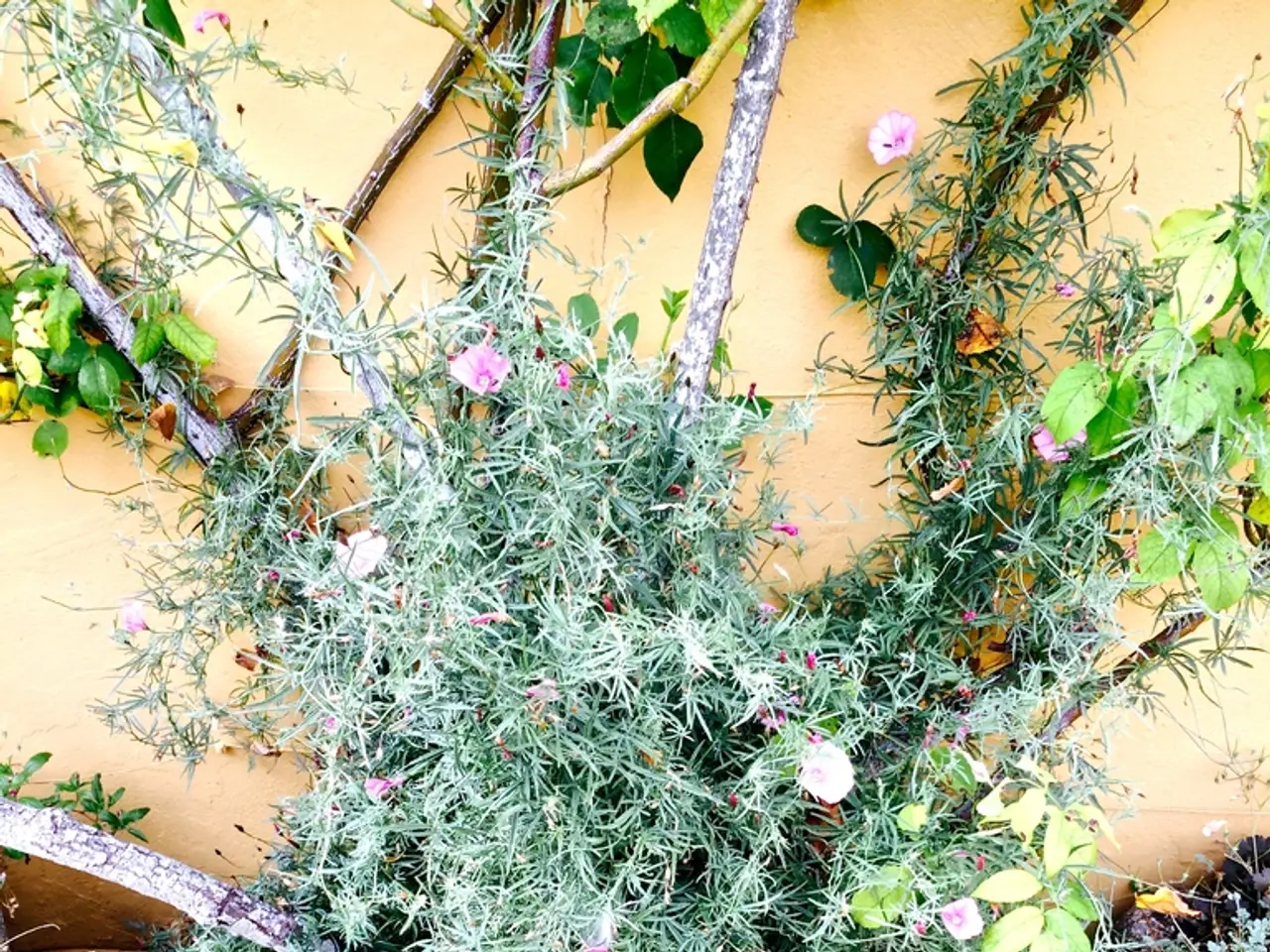Divine Flora of Hindu Mythology: Unveiling the Top 5 Plants
Holy Basil (Tulsi) and the Sacred Trees of Hinduism
In the rich tapestry of Hindu mythology and culture, two plants hold special significance - Tulsi (Holy Basil) and the Banyan tree. Each carries deep spiritual and medicinal importance, intertwined in the daily lives of Hindus and the ancient practice of Ayurveda.
Tulsi, the Divine Basil
Tulsi, also known as Holy Basil (Ocimum tenuiflorum), is revered as a sacred plant, embodying the goddess Tulsi, an incarnation of Lakshmi, the consort of Lord Vishnu. In Hindu tradition, Tulsi symbolises purity, protection, and devotion. It is central to many worship practices, such as the Tulsi Vivah festival, where the plant is ceremonially married to Lord Vishnu or his avatar Krishna.
Tulsi is believed to promote spiritual health and purification, and it is commonly grown in Hindu homes, where it is worshipped daily and thought to protect from evil spirits and enhance piety and meditation. Lord Krishna is often depicted wearing a garland of Tulsi leaves, emphasising its divine connection.
Medicinal Marvel
In Ayurveda, Tulsi is celebrated as the “Queen of Herbs” or “Mother Medicine of Nature” for its vast health benefits. It is used as a digestive tonic, respiratory aid, immune stimulant, anti-depressant, pain reliever, and for treating ailments like asthma, bronchitis, rheumatism, diabetes, fevers, skin diseases, and more. Tulsi's key medicinal properties include anti-inflammatory and pain-relieving effects, respiratory support, anti-stress and adaptogenic effects, immune system boosting, antimicrobial and skin healing properties, protection from insect bites, and purification of air indoors.
The Banyan Tree - Symbol of Divine Grace
The Banyan tree, particularly the Peepal tree (Ficus religiosa), is associated with Lord Vishnu, the protector and preserver of the universe. It is believed to bring blessings of health, prosperity, and protection and is often worshipped for its ability to remove obstacles. The Banyan tree's expansive nature and long lifespan symbolise divine grace in Hindu culture. It is also associated with Lord Shiva and is believed that offering prayers under this tree can bring divine blessings.
The Banyan tree is linked to longevity and wisdom, making it a symbol of vitality. It is believed to symbolise immortality due to its vast, spreading branches and ability to grow new roots from its branches. The Banyan tree's leaves, bark, and roots are used in various traditional practices and remedies, and its medicinal properties are highly valued in Ayurveda.
The Neem Tree and Sandalwood - Guardians of Health
The Neem tree (Azadirachta indica) is another sacred plant deeply linked to Lord Shiva, one of the principal deities in Hinduism, and is often referred to as the "village pharmacy" because of its numerous medicinal properties. The Neem tree is believed to possess purifying, healing, and protective qualities and is often used in rituals to ward off negative energy.
The Sandalwood tree (Santalum album) is associated with Goddess Parvati, the wife of Lord Shiva. Sandalwood is highly valued for its medicinal properties, with the oil extracted from Sandalwood used in aromatherapy to promote relaxation and reduce stress. In Hindu rituals, Sandalwood paste is applied to the forehead as a symbol of purity and devotion.
Thus, these sacred plants not only carry deep spiritual significance but also offer practical healing benefits in Hindu culture and Ayurveda.
- These sacred plants, such as Tulsi (Holy Basil), the Banyan tree, Neem tree, and Sandalwood, are integral to Hindi lifestyle and culture, reflected in gardening practices and home-and-garden settings.
- In the world of fashion-and-beauty, the oil extracted from Sandalwood tree is valued for its calming aroma, often used in skincare products for personal-growth and mindfulness.
- The education-and-self-development sector has welcomed the wisdom of Ayurveda, with an increasing focus on the care and cultivation of medicinal plants like Holy Basil, Banyan, Neem, and Sandalwood in nurseries and gardening courses.
- As for the Tulsi Vivah festival, a marvelous fusion of tradition and spirituality, it can be seen as a symbol of personal-growth, fostering the commitment to daily care and piety towards the sacred plant.
- The symbolism of the Banyan tree transcends gardening, representing long-term growth, perseverance, education-and-self-development, and the pursuit for the best version of oneself (personal-growth).




